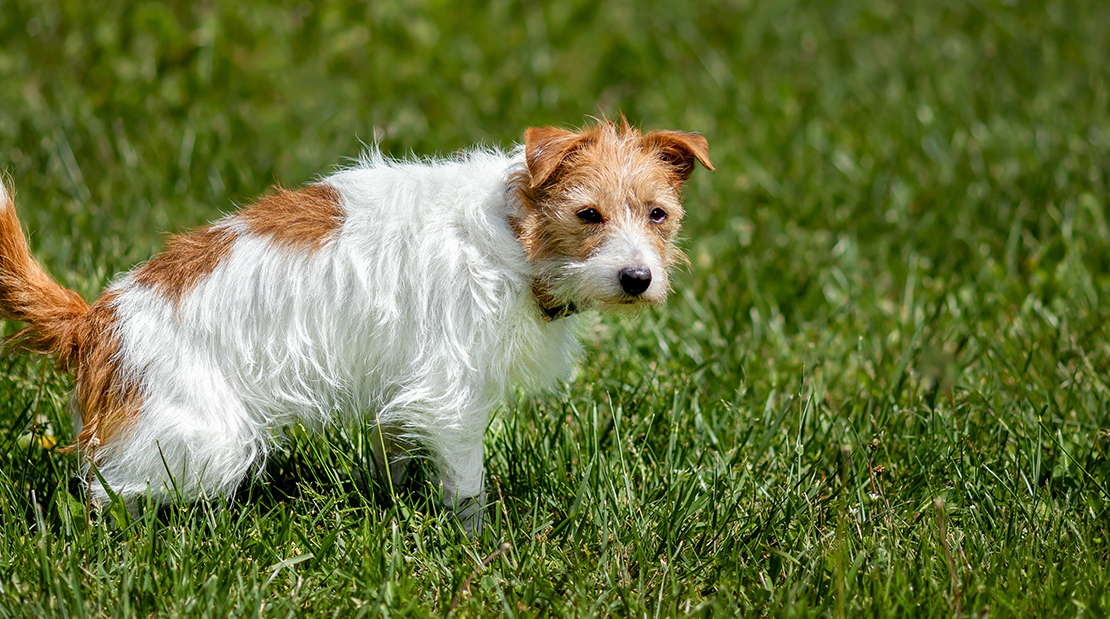
A No-Go Situation: Understanding Constipation in Dogs
Constipation is an issue many dogs deal with at some point in their lives. Recognizing the signs and knowing the common causes of constipation in dogs can help keep your pet safe and help them get the most appropriate care quickly. Here, we’ll discuss the most common factors that cause constipation, how to prevent constipation, and when to contact your vet.
Signs of Constipation in Dogs
First, let’s discuss what constitutes constipation in dogs. Constipation includes the inability to have a bowel movement, infrequent bowel movements, and straining to go. If your dog hasn’t had a bowel movement in two days or more, you should contact your veterinarian.
Common Causes of Constipation in Dogs
There are quite a few different causes of constipation in dogs. The most common causes we see in practice is due to injury or eating foreign objects. This is why it’s so important to contact your veterinarian for an in-depth examination and diagnosis.
Pelvic Fracture
Most constipation we see in practice is caused by a pelvic fracture. Dogs often deal with pelvic fractures due to injuries like being hit by a car. In these cases, the dog’s back may not bend in a way that allows them to empty their bowels.
Nerve Damage
Similar to a pelvic fracture, injury is often to blame for nerve damage or issues with neurological signaling that may be affecting your dog’s ability to feel the need to go. If your dog may have been injured, it’s important to visit your veterinarian to examine any injuries that may not be obvious with a visual scan.
Enlarged Prostate
If your dog shows no sign of injury, we consider the possibility of an enlarged prostate in male dogs. An enlarged prostate often affects the urinary tract through pressure and can affect the fecal tract in a similar way. This pressure can make it more difficult for a dog to defecate.
Foreign Bodies
If your dog has eaten bones, rocks, or small pieces of clothing like socks, these foreign bodies can clog the dog’s digestive tract, making it more difficult to have a bowel movement. Kitty litter – which many dogs find tasty – can also be the culprit for sudden constipation.
Medications
Some prescription medications like opioids, antihistamines, and anticholinergics are known to slow down the GI tract and cause constipation. If your dog is taking any of these medications, let your veterinarian know that they appear to be experiencing constipation as a side effect, so they can properly address the issue.
Diet
It may seem counter-intuitive, but a high-fiber diet can lead to constipation in dogs if they do not also have sufficient water intake to support the amount of fiber they’re eating. A high-fiber diet can firm the feces, leaving it without enough moisture to pass.
Megacolon
Although megacolon is most commonly seen in cats, we sometimes see this issue in dogs. Megacolon essentially refers to a flaccid colon that does not have any stimulation to push and empty itself.
Treating Your Dog’s Constipation
If your dog hasn’t had a bowel movement in two days, I advise you to contact your veterinarian. You should also make an appointment if you notice the signs of constipation remedy themselves but reappear more than twice.
Our first line of treatment may be as simple as an over-the-counter laxative like Miralax, but you should still talk to your veterinarian about the correct dosages and how long to continue any treatment.
Your vet will usually request that your dog come in for a visit to take a closer look at what may be causing the constipation. X-rays and radiography can be used to check for foreign objects in the digestive tract, a swollen prostate, or any unknown injuries.
Prevention
You can take steps to prevent constipation for your dog by ensuring they’re getting a balanced diet with the appropriate food for their size and age, along with proper hydration. You should also monitor their access to potentially harmful items like kitty litter, rocks, and small pieces of clothing. Finally, keep up with their regular check-ups so your vet has an accurate record of your dog’s health and habits.
An informed pet parent is the first line of defense to keeping a dog healthy and happy. Small issues like constipation can signal a more serious problem that needs to be addressed. If your dog is showing signs of constipation, the veterinary team at Cyfair Animal Hospital is equipped to diagnose and treat your dog to get their digestive system back to health.

